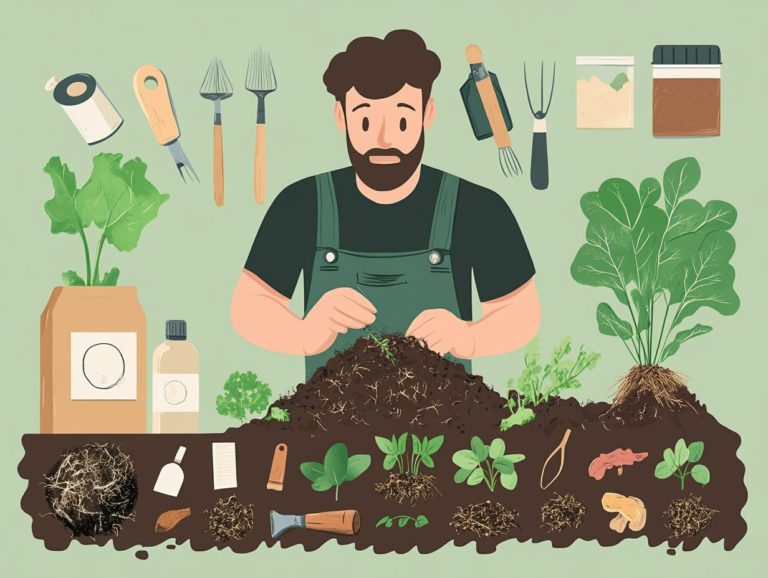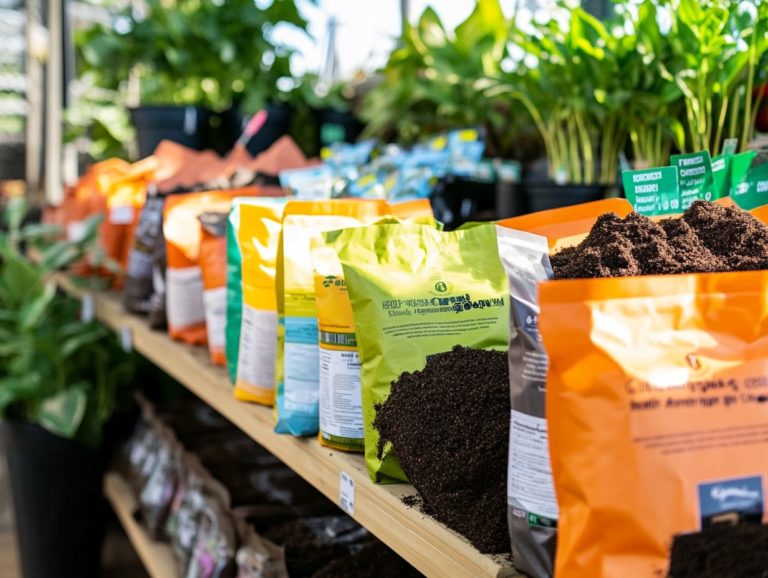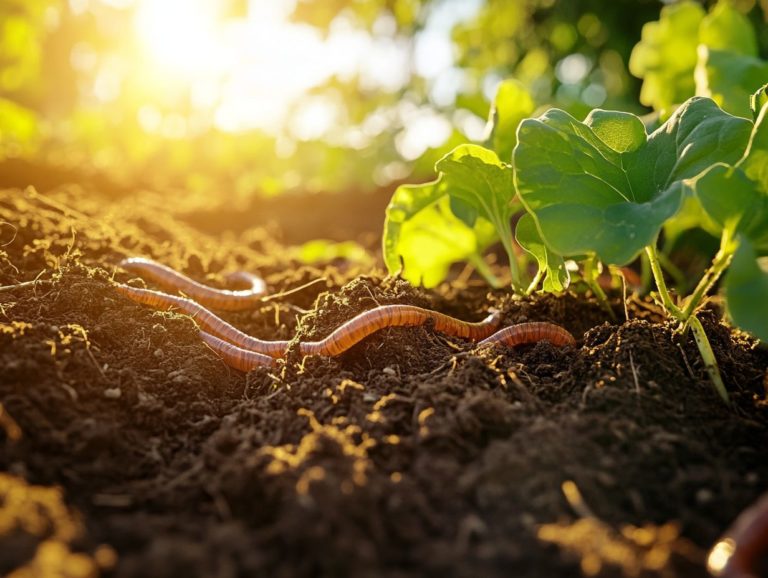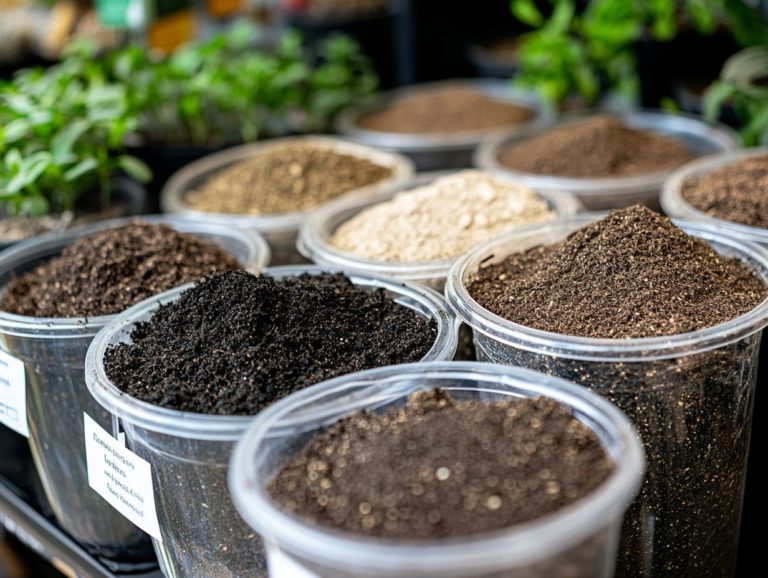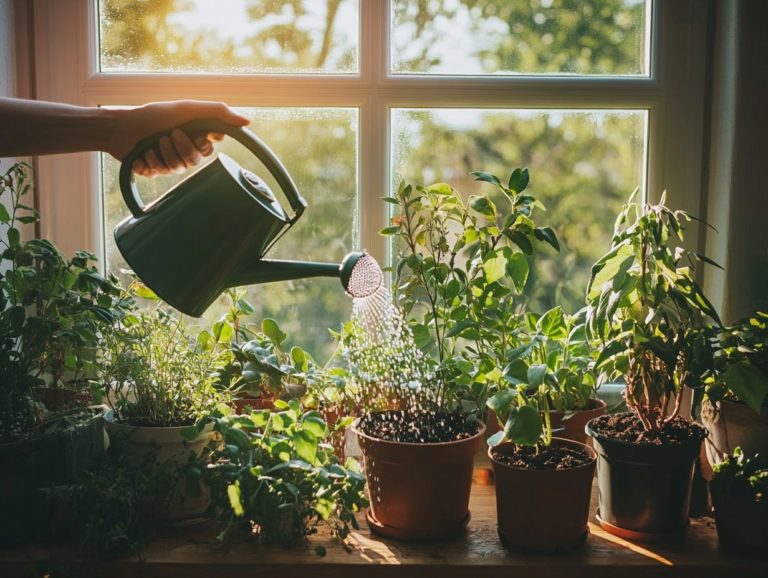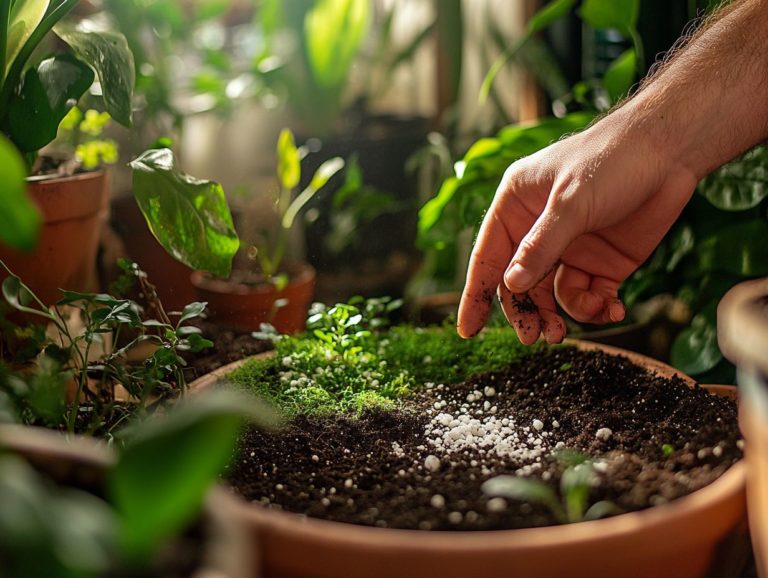The Best Organic Fertilizers for Indoor Plants
Get ready to transform your indoor gardening! Embracing organic fertilizers can truly change the health and vitality of your plants, helping your plants grow while being gentle on the environment.
This article delves into the many benefits of organic fertilizers, from rich compost to nutrient-dense bat guano, and offers guidance on selecting the ideal option for your flourishing green friends.
You ll also find tips to enhance their effectiveness and insights on common pitfalls to steer clear of. Unleash the power of nurturing your plants the natural way!
Contents
- Key Takeaways:
- 1. Benefits of Using Organic Fertilizers for Indoor Plants
- 2. Types of Organic Fertilizers
- 3. Compost
- 4. Worm Castings
- 5. Seaweed Extract
- 6. Fish Emulsion
- 7. Bone Meal
- 8. Blood Meal
- 9. Bat Guano
- 10. Alfalfa Meal
- 11. Green Manure
- 12. How to Choose the Right Organic Fertilizer for Your Indoor Plants
- 13. Tips for Using Organic Fertilizers Effectively
- 14. Common Mistakes to Avoid When Using Organic Fertilizers
- Frequently Asked Questions
- What are the benefits of using organic fertilizers for indoor plants?
- Which organic fertilizers are best suited for indoor plants?
- How often should I fertilize my indoor plants with organic fertilizers?
- Can I make my own organic fertilizer for indoor plants?
- Are there any downsides to using organic fertilizers for indoor plants?
- Can organic fertilizers be used for all types of indoor plants?
Key Takeaways:
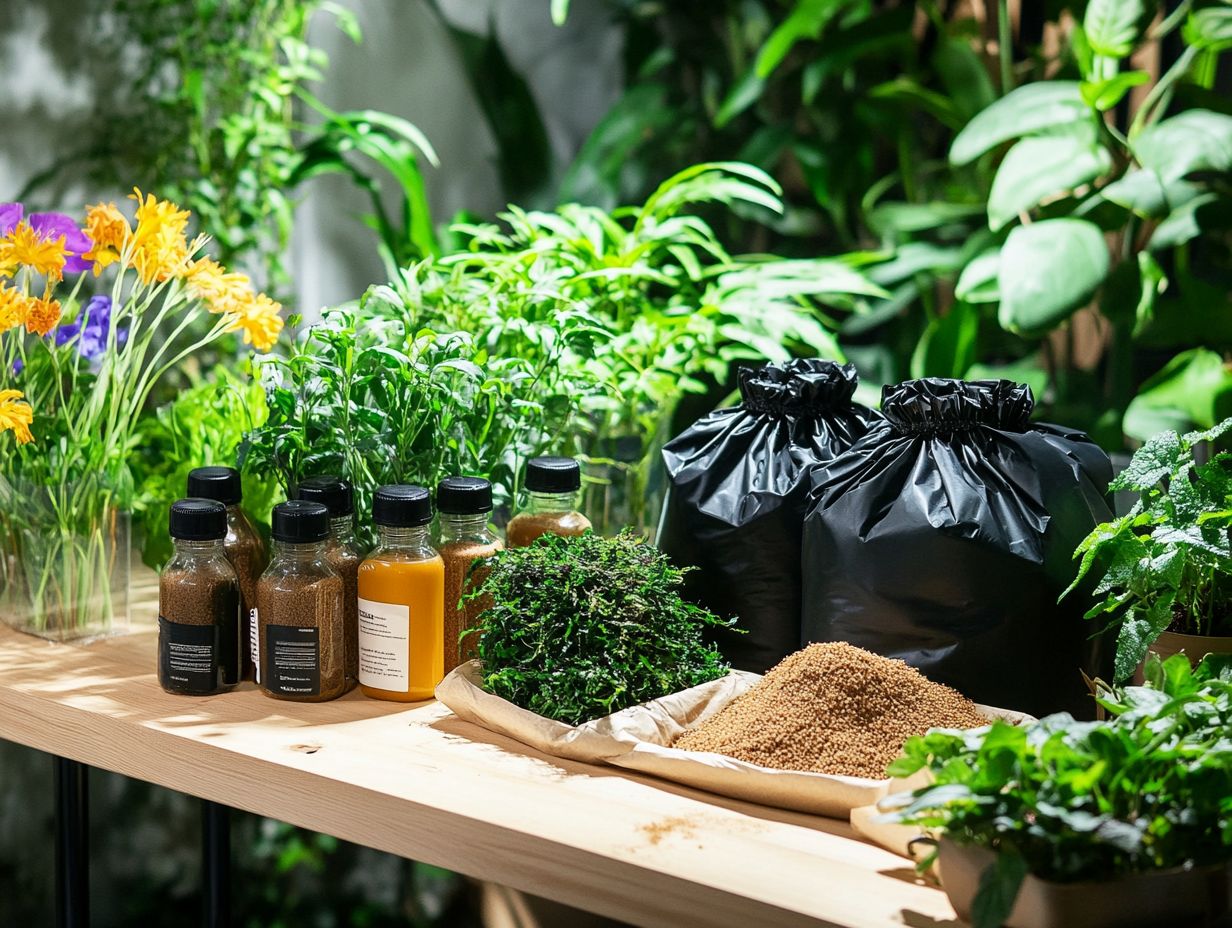
- Organic fertilizers boost soil health, promote plant growth, and are eco-friendly!
- Options for organic fertilizers include compost, worm castings, and more all enhancing plant growth!
- When selecting and using organic fertilizers, consider your plants specific needs and follow the best application methods for great results.
1. Benefits of Using Organic Fertilizers for Indoor Plants
Using organic fertilizers for your indoor plants offers a plethora of benefits, including improved soil health, enhanced nutrient uptake, and the promotion of sustainable gardening practices. These advantages ultimately contribute to the vitality, longevity, and overall plant health of your cherished houseplants.
These natural options are made from ingredients like compost, bone meal, and sea kelp. They enrich the soil while providing a slow, steady release of nutrients that nourish your plants over time. For the best results, consider using the top 10 fertilizers for thriving indoor plants. Organic fertilizers contain beneficial microbes that break down organic matter, making essential plant nutrients readily available for your plants’ enjoyment.
In contrast to synthetic products like Miracle-Gro, which can lead to nutrient burn and deplete soil health due to excessive salts, organic alternatives foster a balanced ecosystem. This results in healthier root systems and robust plant growth. By choosing organic, you ll likely find yourself rewarded with more vibrant foliage, prolific flowering, and an overall more resilient plant.
2. Types of Organic Fertilizers
You ll discover a rich variety of organic fertilizers designed specifically to cater to the diverse nutrient needs of your indoor plants, ensuring they thrive through natural and sustainable ingredients.
Among these options, concentrated liquid fertilizers stand out for their ease of application, delivering essential nutrients directly to your plants’ roots in no time. Fertilizers that contain essential nutrients: nitrogen, phosphorus, and potassium provide a well-rounded nutritional profile that suits a range of plant types perfectly.
Many gardeners have found success using common kitchen scraps, including household kitchen wastes, as excellent organic amendments. Consider these everyday treasures:
- Coffee grounds boost nitrogen and improve soil structure.
- Banana peels contribute potassium and phosphorus.
- Eggshells supply calcium, essential for robust cell wall development.
- Crushed eggshells promote strong and healthy growth in your beloved plants.
Banana peels add nutrients, while crushed eggshells support strong and healthy growth in your beloved plants.
3. Compost
Compost is a cornerstone of sustainable gardening practices. It enriches your soil with organic materials that elevate nutrient levels and foster the growth of vibrant indoor plants.
By transforming everyday kitchen scraps like fruit peels, vegetable trimmings, and coffee grounds into nutrient-rich compost, you can create a thriving environment for your plants. This natural amendment enhances soil structure, nurtures helpful microbes, and retains moisture, which is often lacking in synthetic fertilizers.
Creating compost at home is straightforward and fun: simply layer green materials, such as grass clippings and kitchen scraps, with brown materials like dried leaves or cardboard. Ensure proper aeration throughout the process.
In terms of using compost for plant maintenance, consider these methods:
- Mixing it into the soil
- Applying it as a top dressing
- Incorporating it into potting mixes
Your plants will easily absorb its rich benefits.
4. Worm Castings
Worm castings are a remarkably effective organic fertilizer brimming with helpful microbes and essential nutrients. They profoundly enhance soil health and stimulate vigorous plant growth.
These natural soil amendments are abundant in nitrogen, phosphorus, and potassium key elements vital for plant development. They significantly improve soil structure, allowing for better aeration and water retention. This helps roots penetrate more easily.
This not only boosts nutrient uptake but also creates a thriving ecosystem that attracts helpful insects and microbial life. With their balanced nutrient profile, worm castings foster a sustainable environment for your plants. They help plants become more resilient against pests and diseases, promoting robust root systems that support larger, healthier specimens.
5. Seaweed Extract
Seaweed extract is a remarkable organic fertilizer that can elevate the health and growth of your plants. It’s packed with essential nutrients and growth hormones vital for indoor plants to thrive.
Its rich formulation boasts trace minerals, essential vitamins, and natural growth regulators. Together, these elements enhance nutrient uptake and stimulate robust root development. By promoting microbial activity in the soil, seaweed extract fosters a healthier soil ecosystem that supports plant vitality.
Compared to conventional fertilizers or other organic options, seaweed extract stands out for its gentle, slow-release properties. This minimizes the risk of nutrient burn while ensuring a steady supply of nutrients. It s an outstanding choice for gardeners looking to boost their plants resilience against environmental stresses and diseases.
6. Fish Emulsion
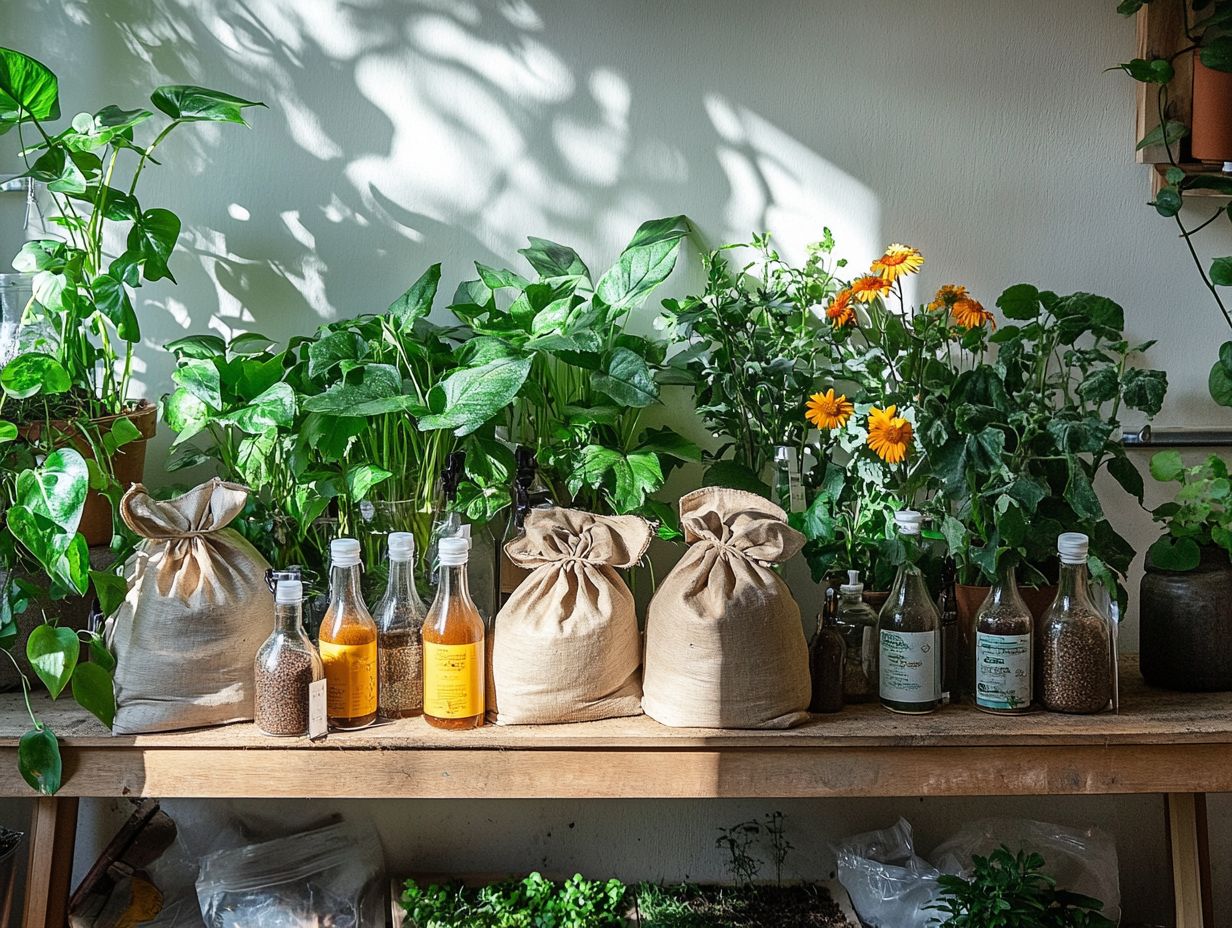
Fish emulsion is a nutrient-rich organic fertilizer that is exceptionally high in nitrogen. It elevates your plant care routine and nurtures the growth of vibrant indoor plants.
This natural fertilizer comes from the byproducts of fish processing. It provides a powerful source of essential nutrients like phosphorus and potassium, vital for overall plant health and development. When used properly, fish emulsion stimulates robust root systems, fostering lush foliage and resilient blooms.
For optimal results, dilute the emulsion with water as indicated on the package usually about one part emulsion to ten parts water. Applying it during the growing season will result in visibly thriving plants, transforming any indoor space into a lush oasis. Try it today and watch your indoor garden flourish like never before!
7. Bone Meal
Bone meal is an organic fertilizer rich in phosphorus. It’s essential for strong roots and overall plant health, making it great for indoor plants.
This amendment enriches the soil and fosters vigorous growth. Its granular form integrates easily into potting mixes, providing plants with accessible nutrients.
Phosphorus is crucial for root establishment and for plants during flowering and fruiting, as it helps with energy transfer and storage.
Bone meal slowly releases nutrients, ensuring your plants thrive over time while minimizing the risk of over-fertilization.
8. Blood Meal
Blood meal is a powerful organic fertilizer loaded with nitrogen. This supports rapid plant growth and boosts nutrient absorption in your indoor plants.
It encourages lush foliage and vibrant blooms while also improving soil structure. You can mix it into the soil at planting or use it as a top dressing for existing plants.
Unlike synthetic fertilizers, blood meal provides a gradual release of nutrients. This makes it a safer choice for sustainable gardening.
9. Bat Guano
Bat guano is an excellent organic fertilizer that offers nitrogen, phosphorus, and potassium. It s essential for healthy plant growth.
In addition to macronutrients, it contains vital micronutrients like calcium and magnesium for strong roots and overall vitality.
Use bat guano by mixing it into the soil or making a nutrient-rich tea. This method ensures even nutrient distribution for lush foliage and vibrant blooms.
10. Alfalfa Meal
Alfalfa meal is a versatile organic fertilizer that supplies essential nutrients for sustainable gardening. It is rich in nitrogen, phosphorus, and potassium.
This nutrient-rich product is known for its high levels of vital nutrients and natural growth hormones, which stimulate root production.
Mix alfalfa meal into your potting soil or sprinkle it on top of potted plants. As the soil moistens, nutrients are gradually released to nourish your plants.
With regular use, you ll promote robust foliage and vibrant blooms, helping your indoor garden thrive all year long.
11. Green Manure
Green manure is an innovative approach to organic fertilization. It involves cultivating cover crops that enhance soil health and supply essential nutrients for your indoor gardening. By using natural fertilizer options, you can significantly improve your indoor plants’ health.
This method enriches your soil with vital nutrients while boosting its structure and moisture retention. Incorporating green crops fosters a thriving ecosystem that promotes beneficial microorganisms. It improves nutrient availability and reduces dependency on synthetic fertilizers.
To maximize these benefits, consider integrating legumes that fix nitrogen or other native plants suited to your environment.
Embrace green manure and explore top soil amendments for healthy indoor plants to transform your indoor gardening into a sustainable and fruitful journey!
12. How to Choose the Right Organic Fertilizer for Your Indoor Plants
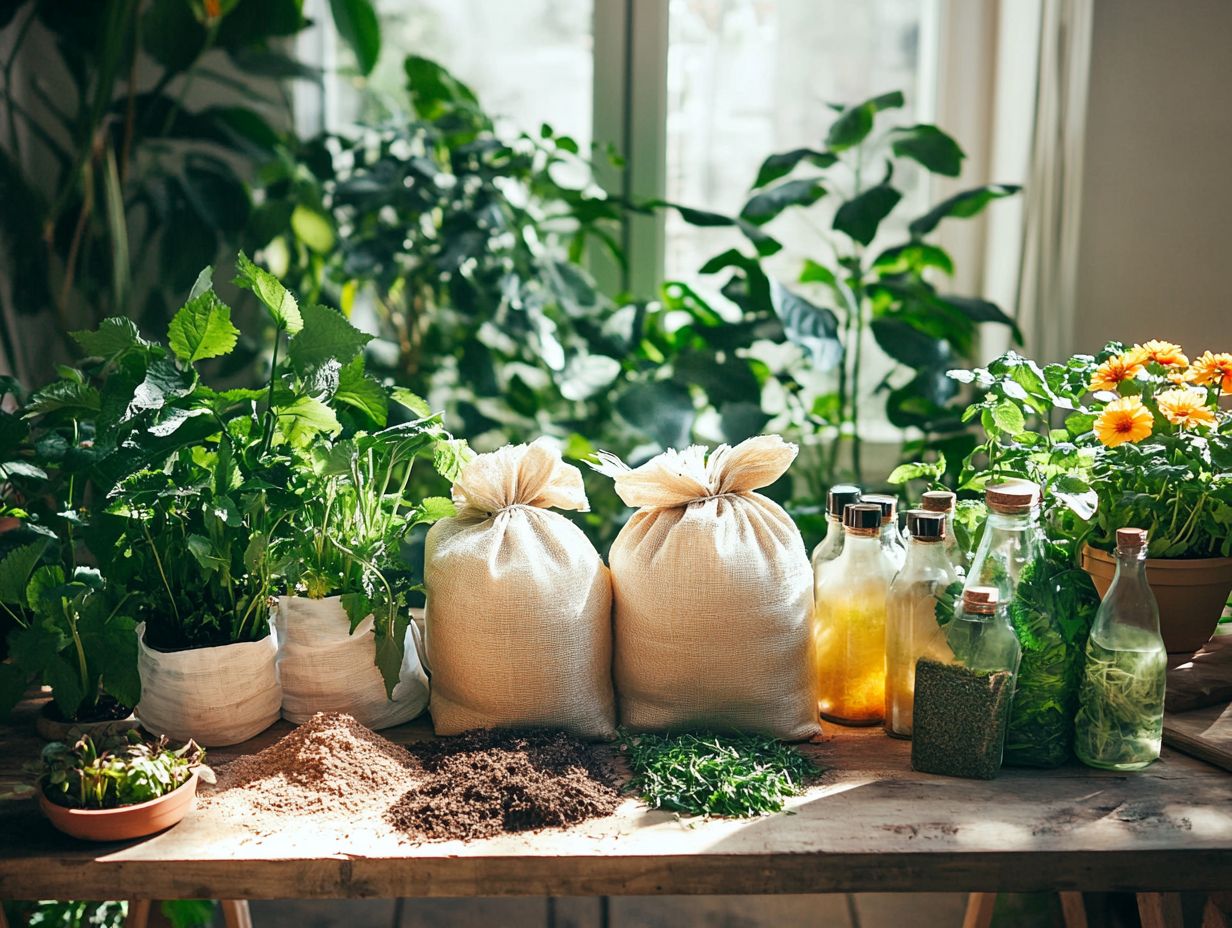
Selecting the right organic fertilizer for your indoor plants is crucial for achieving optimal health, growth, and overall gardening success.
Consider the specific nutrient needs of your plants. Different species require varying amounts of nitrogen, phosphorus, and potassium, known as NPK. For leafy greens, a balanced formula works well, but for optimal growth, it’s important to know the best time to fertilize indoor plants, as flowering plants may need a fertilizer with higher phosphorus content.
Next, assess the efficiency of available products. Check their breakdown rates and how quickly they release nutrients. Look for those that include beneficial microorganisms that enhance nutrient absorption. This thorough analysis will help you make informed choices for a flourishing indoor garden.
Don t delay in choosing the right fertilizer; your plants will thrive with the right nutrients!
13. Tips for Using Organic Fertilizers Effectively
To maximize the benefits of organic fertilizers, implement effective usage tips. This ensures your indoor plants receive the right nutrients and care for optimal growth.
Use high-quality fertilizers designed for indoor gardening. Timing is crucial feed your plants in the active growing season, typically spring and summer, to enhance nutrient absorption.
Always dilute organic fertilizers according to the manufacturer’s recommendations. Stronger concentrations can harm your plants’ delicate roots.
Watch how your plants respond. If leaves turn burnt or yellow, it may indicate over-fertilization. Adjust your feeding schedule accordingly.
Regular monitoring helps you find the perfect balance of fertilizer. This way, your plants thrive without being overwhelmed by nutrients.
14. Common Mistakes to Avoid When Using Organic Fertilizers
Avoid common mistakes with organic fertilizers to keep your plants healthy. One frequent error is overlooking the advantages of using natural fertilizers from household kitchen waste.
Over-fertilizing can lead to nutrient burn, disrupting healthy growth. Ignoring soil health is another common misstep; knowing your soil’s composition is key.
Test your soil and fertilizers regularly. This allows you to customize your approach and avoid complications.
Keep a close eye on your plants. Monitoring leaf color and growth patterns helps you identify early signs of nutrient deficiencies.
Invest time in learning about organic fertilizers and soil health. This knowledge significantly increases your gardening success.
Frequently Asked Questions
What are the benefits of using organic fertilizers for indoor plants?
Organic fertilizers provide essential nutrients to plants while improving soil health and promoting beneficial microbial activity. They are safe for children and pets, making them eco-friendly options for your plant ecosystem.
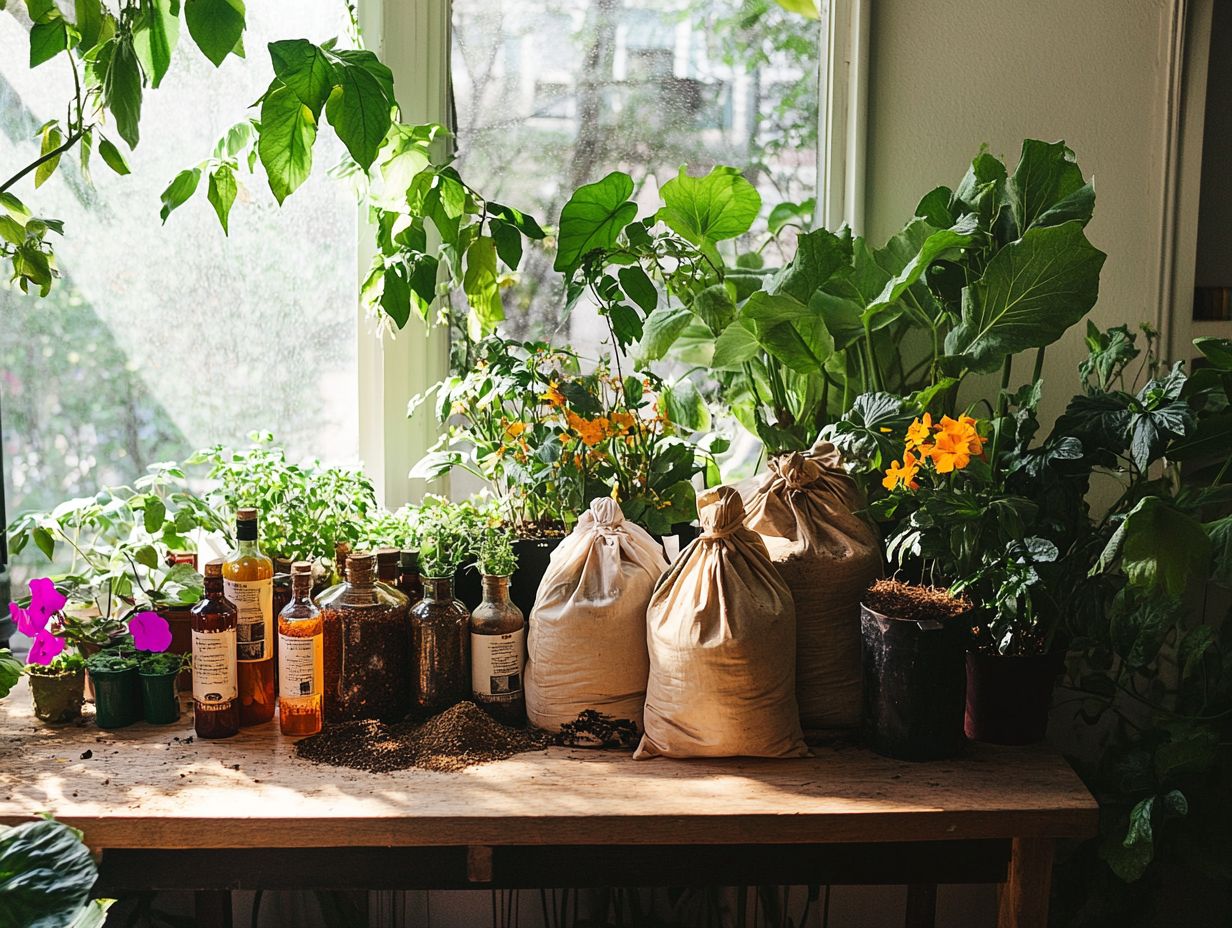
Which organic fertilizers are best suited for indoor plants?
Some top organic fertilizers for indoor plants include compost, worm castings, seaweed extract, and fish emulsion. These options offer a balanced mix of nutrients and can be used in both liquid and solid forms.
Exploring natural fertilizer choices will help you find the perfect match for your plants.
How often should I fertilize my indoor plants with organic fertilizers?
Fertilizing frequency depends on the type of fertilizer and your plants’ needs. Generally, fertilizing once a month during the growing season works well.
Cut back on feeding during the winter when your plants are resting. Using a strong liquid fertilizer can simplify this process.
Can I make my own organic fertilizer for indoor plants?
Absolutely! You can create your own organic fertilizer using common household items like coffee grounds, eggshells, and vegetable scraps. This cost-effective option ensures your plants receive all-natural nutrients.
Consider using rice water or banana peels to supercharge your plants!
Are there any downsides to using organic fertilizers for indoor plants?
One downside is that organic fertilizers might not give an instant nutrient boost like synthetic ones do. This means you’ll need to be patient and plan ahead when fertilizing your indoor plants.
However, the long-term benefits for your plants and the environment make it worthwhile. Remember, plant roots need time to adapt!
Can organic fertilizers be used for all types of indoor plants?
Yes, natural plant food works well for indoor plants like houseplants, herbs, and vegetables. Adjust the amount and frequency of fertilizing to meet each plant’s unique needs.
Some plants need more or less food depending on their growth. Brands like Jobe s, Bloom City, and Osmocote offer great options to help your plants thrive!
Give your indoor plants the best care with natural plant food! They thrive on it! Don’t wait! Adjust their food intake today for lush growth!

